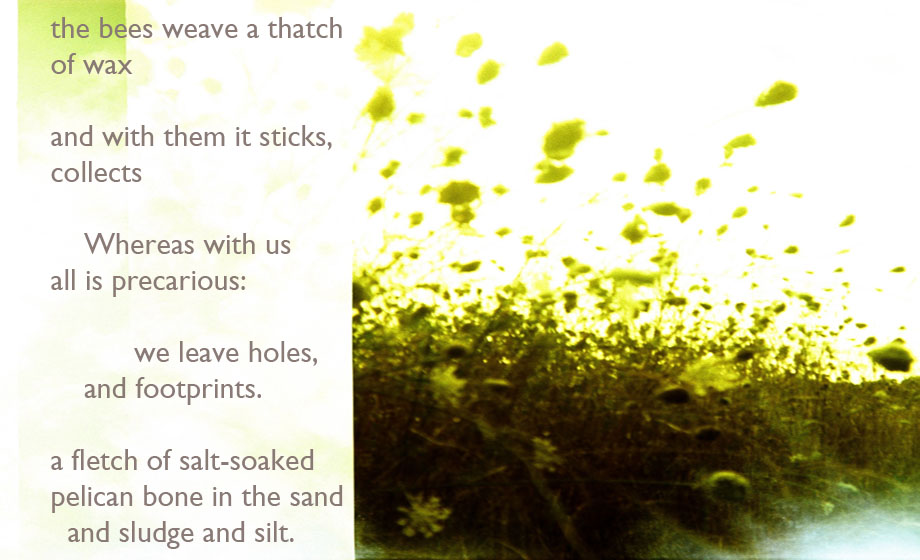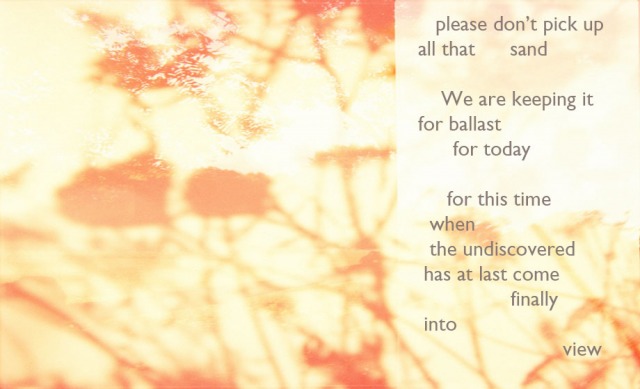October 15, 2010
Poets for Living Waters is a poetry action in response to the BP Gulf oil disaster of April 20, 2010, one of the most profound man-made ecological catastrophes in history. They are creating a phenomenal online memorial of thousands of poems in response to the disaster, with poets around the world contributing pieces that voice a multiplicity of responses.
Their web action is, in my opinion, a meaningfully-altogether-new form of memorial, and a means of resistance that has longevity. By working with poets, they are invoking an intellectual, artistic, spiritual shamanic memorial – I say shamanic memorial because this web action will likely do nothing tangible to restore the Gulf, but creates a momentum and a lasting, google-able electronic nexus of protest.
A triptych of my prose poems and photographs appear there, in a little collection called SIX AQUATIC GODDESSES OFFER THEIR NOTES ON THE NEW CENTURY.
Our brains are now conditioned to hearing the diatribes and polarized harangues of protest, but have become estranged from the subtle shamanic language of lyricism. We cannot sacrifice ourselves and lose access to listening for the beauty that accompanies us on our path. This lyricism leaves room for complexities long ago discarded by the syntax of headlines and soundbytes.
Sometimes lyricism is needed for the brain and heart to process the unwieldy bits of life.
I think this PFLW memorial returns lyricism to catastrophe, and brings a multiplicity of poets into the weave. This kaleidoscopic beauty makes the catastrophe approachable – I think beauty, in its allure, does draw people near – and people absolutely must draw near to these disasters if we are to fix them.
Shock and awe create aversion, whereas poetry can seduce.

I think Chaim Bialik would approve of Amy King and Heidi Lynn Staples’ project. Bialik, whose poems against early 20th century pogroms in Russia did not truly bear fruit for another fifty to one hundred years when people were ready to hear the sophistication of his protest, and because the tragedies of the 1930s and 40s had shown his poetry to be prescient.
In 1903, there were many who thought it silly and self-indulgent to write a twenty page poem protesting the murder of a hundred village Jews. But he was leaving a trail for us to follow later, when we search to understand the very consequences he had tried to warn us about.
Maybe in making art of resistance, we must accept and then ignore its contemporary inutility, its contemporary uselessness, and instead express for a distant future we may likely never live to see. Our work as messages from an island that may never be found. Where survivors may never be retrieved.
Too many of us persuade ourselves into thinking that the “unimaginable” cannot be imagined, the “unspeakable” cannot be expressed, and we clumsily, shamefacedly shutter our potential power through arguments that fail in the test of time. A poem won’t stop an oil well or a massacre. But write a poem designed to deliver its message later, when it’s possible that things will be even worse, when folks will be looking back at our traumatized ecology finally paying attention (often, too late, as when we gaze backwards at the Holocaust).
Should we write witness poems imagining that the problem we protest could, in fact, become worse? And that now is the very time to struggle to speak about it?
In centuries (if our species survives that long) we may look back and wonder what brought us to this point. Actions like Poets for Living Waters, perhaps, are waiting for that time. And we must be writing for that time…
Poetry created in support of shrimp will perhaps never be truly celebrated, but it’s still important to the shrimp, I’d like to think.
The whole trouble with shamans is that as foretellers of the future, their words can only ring true in hindsight. Like the shrimp, who can’t breathe down there anymore. Perhaps there is one breathless prawn surrounded by her dead babies creating her own prawn poem in the silt. She and I write to each other, and maybe that’s all there is?
In the meantime, I feel a great deal of pain for the individual shrimp and for the collective shrimp, and hope that if human kind extincts ourselves, they will at least get to live in a cleaner piece of sea.
The Poets for Living Waters mission statement includes this: “Former US poet laureate Robert Pinsky describes the popularity of poetry after 9/11 as a turn away from the disaster’s overwhelming enormity to a more manageable individual scale. As we confront the magnitude of this recent tragedy, such a return may well aid us.”
I know that marketing research, like Robert Pinsky, indicates that individual scale is more manageable than an overwhelming enormity, but in terms of resistance artmaking, I think we need to focus more on the overwhelming enormity: to realize the arc of our work should perhaps not peak in meaning until after our own lives have drawn to a close. And I don’t think that’s wrapped up in the pursuit of canonization, or about being avant-garde, or about being unappreciated, or achieving fame’s promise of longevity, or losing our way within similar contests in popularity or accessibility.
Let’s agree to make art for the seventh generation. They might need it.
Every era has been a strange and shocking era. But as artists, this era is ours, and whatever we witness, we are the only ones to do it. But we have to actually witness. To do the work. We might be the only ones to do so. And like my beloved Chaim Bialik, sent to the village to file a report on the pogrom and in addition providing a poem: witness art is made to last in ways that outlast the artist. Art that endures not because of our names or even our talents, but because of the magnitude of what’s been witnessed and resisted.
I suspect many more of us could be making art intended to overshadow our selves. I know that many of us are making that art, and lack access to the means to share it. Which is another reason why Heidi Lynn Staples and Amy King – the editors of Poets for Living Waters – are truly wonderful humans.
I’m not saying anything new or exciting or different. I’m saying bravo to editors and artists and shamans who urge artists to step up to the witness stand and utter something awkward and magnificent and impractical and powerful.
And to Robert Pinsky, I say…I suspect more of us should be training our eyes to see the overwhelming enormity, and the individual will follow close behind.

detail from “six aquatic goddesses…” (c) quintan ana wikswo
.
